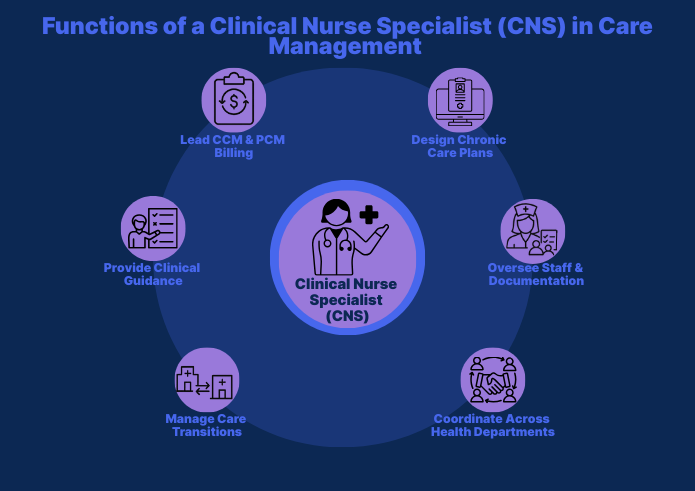What is a Clinical Nurse Specialist (CNS)?
A Clinical Nurse Specialist (CNS) is an advanced practice registered nurse (APRN) who holds graduate-level education and clinical training in a specialized area of nursing practice. CNSs are certified in specific population domains (e.g., adult-gerontology, pediatrics, mental health) and serve as expert clinicians, educators, and care coordinators.
In the context of Chronic Care Management (CCM) and other CMS-recognized programs, CNSs are designated as Qualified Health Professionals (QHPs). This allows them to bill Medicare directly for time-based and service-based codes such as CCM, PCM, and TCM, as long as they are properly credentialed.
Though less common in primary care practices than NPs or PAs, CNSs frequently operate in hospital systems, specialty clinics, and transitional care teams, where they help optimize chronic disease management, staff education, and care coordination.
Key Functions of a CNS in Care Management
Clinical Nurse Specialists play a vital role in improving the quality and efficiency of chronic care delivery—particularly in complex, team-based environments. Their dual focus on clinical excellence and systems-level improvement makes them a valuable asset for CMS-recognized care management programs.
A CNS may be responsible for:
- Leading care management workflows as the billing provider in CCM and PCM programs
- Developing and optimizing care plans for patients with multiple chronic conditions
- Supervising clinical staff and ensuring compliance with CMS documentation standards
- Providing consultation and advanced clinical support for frontline care teams
- Designing and implementing care transition protocols for high-risk patients
- Coordinating interdepartmental communication in health systems or specialty clinics
Because CNSs are often embedded in structured care teams, they help ensure that chronic care services meet clinical, operational, and regulatory requirements—all while improving patient outcomes.

The Role of a CNS in Care Delivery
Clinical Nurse Specialists occupy a unique space in the healthcare ecosystem: they provide direct patient care while also shaping system-level outcomes. In care delivery settings that rely on chronic care models or coordinated teams, CNSs serve as both clinical leaders and operational strategists.
In practice, CNSs may:
- Deliver direct clinical services to patients with complex or chronic conditions
- Serve as the designated provider overseeing care management billing and documentation
- Lead interdisciplinary care teams, helping streamline communication and reduce duplication
- Educate and mentor other providers—especially in care planning and chronic disease pathways
- Identify systemic barriers to care and implement process improvements to close gaps
- Bridge primary, specialty, and behavioral care teams in integrated models like CoCM or TCM
This hybrid role makes the CNS especially effective in institutional care settings, where multiple providers, services, and technologies converge around chronically ill populations.
Billing and Supervision Rules for Clinical Nurse Specialists (CNSs)
Clinical Nurse Specialists are recognized by CMS as Qualified Health Professionals (QHPs), which grants them the authority to bill directly for several care management services when enrolled as Medicare providers.
Eligible CMS programs for CNS billing include:
- Chronic Care Management (CCM) – CPT 99490, 99439, 99491
- Principal Care Management (PCM) – CPT 99424–99427
- Transitional Care Management (TCM) – CPT 99495–99496
- Advance Care Planning, Annual Wellness Visits, and other time-based codes
Supervision Capabilities for CNSs:
CNSs are permitted to supervise auxiliary clinical staff (e.g., RNs, medical assistants, care coordinators) delivering CCM or PCM services. Their supervision meets CMS’s general supervision requirement, as long as they are the billing provider and all time/documentation thresholds are met.
Credentialing Note for CNSs:
To bill Medicare, CNSs must be:
- Licensed in the state of practice
- Certified by a nationally recognized board (e.g., ANCC) in a defined population focus
- Individually enrolled in Medicare as a CNS provider
Although CNSs are not as commonly found in outpatient clinics as NPs or PAs, their billing status is equivalent—and can be particularly valuable in hospital-affiliated or specialty practices.
Frequently Asked Questions about Clinical Nurse Specialists (CNSs)
1. What is a Clinical Nurse Specialist (CNS)?
A CNS is an advanced practice registered nurse with graduate-level education and specialized clinical expertise. CNSs are trained to deliver direct patient care and improve care systems, particularly in complex or chronic conditions.
2. Can a Clinical Nurse Specialist bill Medicare for care management services?
Yes. CNSs are recognized as Qualified Health Professionals (QHPs) by CMS and can independently bill for CCM, PCM, TCM, and related time-based services, assuming proper credentialing and enrollment.
3. Are CNSs allowed to supervise other clinical staff under CMS programs?
Yes. CNSs may supervise care team members such as RNs and medical assistants for non-face-to-face care management services. They must ensure documentation meets CMS guidelines for billing compliance.
4. How does a Clinical Nurse Specialist differ from a Nurse Practitioner (NP)?
While both are APRNs, CNSs focus on clinical expertise and systems improvement in specific specialties, often within hospitals or complex care environments. NPs are trained in a primary care model and are more commonly seen in outpatient settings.
5. What CMS billing codes can CNSs use?
CNSs may bill CPT 99490 and 99439 for CCM, 99424–99427 for PCM, and 99495–99496 for TCM. They may also bill for services like Annual Wellness Visits and Advance Care Planning.
6. Do Clinical Nurse Specialists work in primary care practices?
While possible, CNSs are more commonly embedded in hospital systems, transitional care teams, or specialty clinics due to their dual clinical and systems-focused role.
